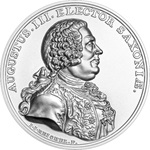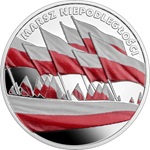 |
Nowo¶ci |
 |
 |
Informacje |
 |
 |
Plan
emisyjny monet
i banknotów w 2018 roku:
Polska Reprezentacja Olimpijska PyeongChang
- 200 zł, 10
zł
Wyklęci przez komunistów żołnierze niezłomni August Emil
Fieldorf „Nil”
- 10 zł
Wielcy polscy ekonomiści
Fryderyk Skarbek
- 10zł
Moneta okolicznościowa z napisem 100-lecie odzyskania przez Polskę
niepodległości
- 5 zł
Polskie Termopile - Hodów
- 10 zł
100-lecie czynu zbrojnego Polonii amerykańskiej
- 10 zł
Skarby Stanisława Augusta
Henryk Walezy
- 500 zł, 50 zł
Historia monety polskiej boratynka, tymf Jana Kazimierza
- 20 zł
760-lecie Towarzystwa Strzeleckiego Bractwa Kurkowego
w Krakowie
- 10 zł
100-lecie powstania Gimnazjum
i Liceum im. Stefana Batorego
w Warszawie
- 10 zł
POLONIA RESTITUTA
- 10 zł
125-lecie działalności Teatru im. Juliusza Słowackiego w Krakowie
- 10 zł
Niepodległość
- 20 zł (banknot
kolekcjonerski)
Stulecie odzyskania przez Polskę
niepodległości – Ignacy Jan Paderewski
- 100 zł, 10 zł
100. rocznica odzyskania przez Polskę
niepodległości
- 1 zł, 2018 zł, 100 zł
Wyklęci przez komunistów żołnierze niezłomni
– Hieronim Dekutowski „Zapora”
- 10 zł
100. rocznica wybuchu Powstania
Wielkopolskiego
- 200 zł, 10 zł
|
 |
 |
|
 |
 |
Wiadomo¶ci |
 |
|
|
Dla numizmatyka
Monety złote, srebrne, Nordic Gold, monety polskie i zagraniczne, złote sztabki, banknoty, złoto lokacyjne, abonament numizmatyczny ...
Sklep z monetami ...
Zapraszamy do zakupów!
Sklep numizmatyczny.pl
|
|
 |
Polecamy |
 |
|
|
|
 |

Dostępno¶ć: produkt dostępny
|
50 zł, Skarby Stanisława Augusta - August III Sas, 2023
Producent: NBP
ID: 3377
|
|
Srebrna moneta kolekcjonerska o nominale 50 zł wybita z czystego srebra o wadze 2 uncji (62,2 gr) z serii Skarby Stanisława Augusta przedstawiaj±ca króla Polski Augusta III Sasa. |
|
 |
|
|
|
|
|
 |

Dostępno¶ć: brak
|
10 zł, Marsz Niepodległo¶ci, 2023
Producent: NBP
ID: 3372
|
|
Srebrna moneta kolekcjonerska o nominale 10 zł wybita z okazji organizowanych co roku marszów niepodległo¶ci. |
|
 |
|
|
|
|





